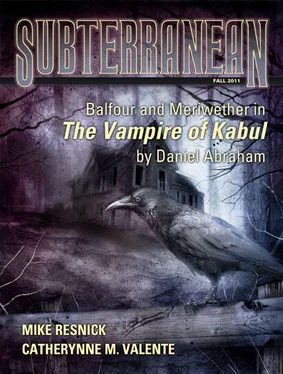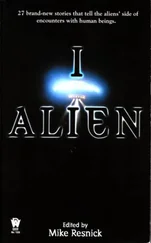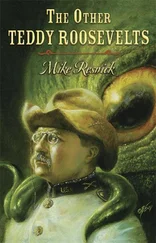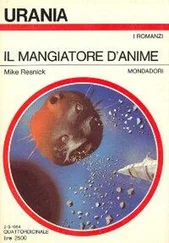Mike Resnick - Shaka II
Здесь есть возможность читать онлайн «Mike Resnick - Shaka II» весь текст электронной книги совершенно бесплатно (целиком полную версию без сокращений). В некоторых случаях можно слушать аудио, скачать через торрент в формате fb2 и присутствует краткое содержание. Год выпуска: 2011, Издательство: Subterranean Press, Жанр: Фантастика и фэнтези, на английском языке. Описание произведения, (предисловие) а так же отзывы посетителей доступны на портале библиотеки ЛибКат.
- Название:Shaka II
- Автор:
- Издательство:Subterranean Press
- Жанр:
- Год:2011
- ISBN:нет данных
- Рейтинг книги:3 / 5. Голосов: 1
-
Избранное:Добавить в избранное
- Отзывы:
-
Ваша оценка:
- 60
- 1
- 2
- 3
- 4
- 5
Shaka II: краткое содержание, описание и аннотация
Предлагаем к чтению аннотацию, описание, краткое содержание или предисловие (зависит от того, что написал сам автор книги «Shaka II»). Если вы не нашли необходимую информацию о книге — напишите в комментариях, мы постараемся отыскать её.
Shaka II — читать онлайн бесплатно полную книгу (весь текст) целиком
Ниже представлен текст книги, разбитый по страницам. Система сохранения места последней прочитанной страницы, позволяет с удобством читать онлайн бесплатно книгу «Shaka II», без необходимости каждый раз заново искать на чём Вы остановились. Поставьте закладку, и сможете в любой момент перейти на страницу, на которой закончили чтение.
Интервал:
Закладка:
He nodded. “Don’t look so disappointed. This is a very important posting.”
“Perhaps you will explain what makes it so?” I said, for in my mind it was actually a lesser position than Postmaster, which wasn’t much to begin with.
He smiled. “Take a week to find your way around Beira. Play some golf, visit the casino, do a little sailing.”
“It sounds easy enough,” I said, waiting for the other shoe to drop.
“At the end of the week, you will pay a visit to the President of Mozambique and deliver this.” He handed me an envelope bearing the official seal of the President. Another smile. “It will be your last duty as Postmaster.”
“What’s in it?”
“Our demand that they turn over their half of the Kruger National Park to us. It was unfairly divided centuries ago.”
“Do we care?” I asked. “Are you planning on building a city on park land?”
“Certainly not. It is home to the last wild animals on the continent. I wouldn’t dream of changing it.”
“Then I repeat - what is this all about?”
“We want restitution for all the centuries that they have profited from land that should legally have been ours,” said Robert.
“What are you talking about?” I said. “The land was divided by a treaty that was ratified and signed by both countries.”
He shook his head. “It was signed by white squatters who took the land and the government away from the indigenous peoples. It is not a legal treaty.”
“Mozambique has no money,” I persisted. “What can they be making in park fees? Three thousand rands a year, if that?”
“I know. That is why we will not ask for money.”
“I thought you said you wanted restitution.”
“I do,” he replied.
“I don’t understand.”
He walked to the map and pulled a pen out of his pocket. “This is approximate,” he said, drawing a line across the lower third of Mozambique. “This will constitute our restitution.”
I stared at the map in silence for a moment. “You can’t be serious,” I said, although I knew he was.
“It is prime pastureland,” replied Robert. “There are rivers than can be diverted to South Africa during droughts. There is a huge population that has been trying to cross our border for generations, and will be happy to work for whatever wages we offer them, however minimal—and that in turn will keep our own people in line.”
“Mozambique will never agree to it,” I said.
“And we have a well-trained army,” he continued, “an army that needs something to do.”
“It’ll be a slaughter.”
“It will be a good training exercise.”`
“You sound like there’s more,” I said.
“We have treaties with Namibia, Botswana, Zimbabwe, Angola…”
“Just how far north do you plan to go?” I demanded.
“Have you ever seen the Mediterranean, my brother?” he asked. “It is quite beautiful this time of year.”
“There have been wars of conquest on this continent before.”
“Led by madmen and fools,” he replied. “I am neither.”
“You really mean to do it?”
He gestured toward the letter. “It is done.”
“Then let someone else deliver it,” I said. “I’ll stay where I am.”
“My mind is made up,” he said. “You will be my ambassador to Mozambique.”
“Why me?” I asked. “You have generals and hirelings who would love to make the President of Mozambique squirm.”
“That is precisely why I want you,” said Robert. “You are a compassionate man who will sympathize with him.” He shot me a triumphant smile. “I know you give most of your salary to local orphanages. You even feed stray dogs and cats. You cannot hide your nature from me, my brother, and you will not be able to hide it from him.”
“What has that to do with anything?”
“When you tell him, truthfully and in some detail, exactly what will befall him and his people should he refuse my demands, when he sees that you actually care, that you do not want his country to become a smoking junk-heap, he will know that I mean what I say, and further, he will know precisely because of your reaction, that I have the power to do what I say.”
“Am I then to become your ambassador to every other country you wish to conquer?” I asked bitterly.
“I have no interest in conquest,” he said.
“Oh? What do you call it?”
“Assimilation,” he replied. “We are one land mass. Once, there were twenty-three hundred tribes, twenty-three hundred separate nation-states, living on this continent. Then the Europeans gave us false borders, and suddenly there were fifty-one countries. It is time for one more redrawing of the map: one continent, one country.”
“And one ruler?” I asked.
“And one ruler,” he agreed.
I delivered the envelope to the President of Mozambique exactly one week later. He opened it, read it, frowned, and asked me if the President was serious, or if this was a bad joke. I assured him that Robert ole Buthelezi was in deadly earnest, and urged him to relinquish the land rather than enter a war he couldn’t possibly win.
He was a proud man, and he tore the demand up, put it back in the envelope, and told me to deliver it to the President.
Three weeks later the South African third, fifth and eighth divisions marched across the Kruger Park and into Mozambique. The Mozambique army fought bravely, but they were outnumbered, outgunned, and overmatched. Within ten days every one of them was dead or a prisoner of war, and Robert announced to his people that South Africa’s territory had just increased by more than sixty thousand square miles.
It would not be the last such announcement that he would make.
7.
Five months later, when Robert threatened to go to war with Namibia over water rights, they surrendered without a shot being fired. He politely suggested that they might like to become a protectorate, or better still, a province, and they agreed.
Botswana saw what was happening, and they knew that they were the treasure of Southern Africa, because they sat on the largest diamond pipes, larger and more productive than South Africa in its heyday. They were the only African nation besides our own that could truly be said to have a thriving economy.
And they knew how to use that economy. I was in the Presidential Palace when the first word came through: our crack sixth division had been turned back at the Botswana border, with better than fifty percent casualties.
We knew it couldn’t be the Botswana army, because Botswana didn’t have an army. It was eighty percent Kalahari Desert, and another ten percent Okavango Swamp. Even in the 25th Century the population hadn’t reached three million. Almost all of them lived along the Limpopo River, and they had not gone to war with anyone in their entire history.
It didn’t take long to find out what had happened. The rest of the continent—indeed, the world—was not unaware of what was happening down at the southern tip of Africa, and Botswana had used some of its wealth to hire an army of mercenaries, led by an American veteran of the Battle of Io, a Colonel McBride. They had the latest weapons, the latest technology, and an employer that was willing to supply them with whatever they needed to preserve its territorial integrity.
Robert, who usually dined at the finest restaurants in Pretoria, chose to have dinner in his expansive office. He invited three of us—two political advisors, whose advice he never listened to, and myself—to join him in the huge, carpeted room that was dominated by two paintings of Robert himself, one staring down at his desk, the other looking out over the balcony at the extensive, exquisitely-manicured grounds.
“You look troubled,” I said when I entered the office, the last to arrive.
Читать дальшеИнтервал:
Закладка:
Похожие книги на «Shaka II»
Представляем Вашему вниманию похожие книги на «Shaka II» списком для выбора. Мы отобрали схожую по названию и смыслу литературу в надежде предоставить читателям больше вариантов отыскать новые, интересные, ещё непрочитанные произведения.
Обсуждение, отзывы о книге «Shaka II» и просто собственные мнения читателей. Оставьте ваши комментарии, напишите, что Вы думаете о произведении, его смысле или главных героях. Укажите что конкретно понравилось, а что нет, и почему Вы так считаете.












